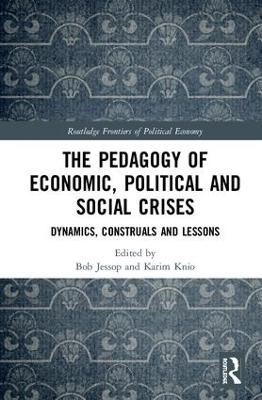
The Pedagogy of Economic, Political and Social Crises
Routledge (Verlag)
978-1-138-06250-4 (ISBN)
Crises have been studied in many disciplines and from diverse perspectives for at least 150 years. Yet recent decades have seen a marked increase in the crisis literature, reflecting growing awareness of crisis phenomena from the 1970s onwards.
Responding to this mainstream literature, this edited collection makes six key innovations. First, it distinguishes between crises as event and crises as process, as well as crises as accidental events or as the result of system-generated processes. Second, it distinguishes crises that can be managed through established crisis-management routines from crises of crisis management. Third, it focuses on the symptomatology of crisis, i.e., the challenge of moving crisis symptoms to understanding underlying causes as a basis for decisive action. Fourth, it goes beyond the cliché that crises are both threat and opportunity by distinguishing valid accounts of the origins and present nature of a crisis, from more speculative accounts of what potentially exists. Fifth, it explores how crises can disorient conventional wisdom, thus provoking efforts to interpret and learn about crises and draw lessons after a crisis has ended. Finally, the sixth element is the move away from the conventional focus on executive authorities and disaster management agencies, instead turning attention towards how other social forces construe crises and attempt to learn from them.
Offering important insights into the pedagogy of crisis throughout, this collection will offer excellent reading to both researchers and postgraduate students.
Bob Jessop is Distinguished Professor of Sociology and Co-Director of the Cultural Political Economy Research Centre at Lancaster University, UK. He is best known for his contributions to state theory, critical political economy, the analysis of comparative welfare regimes, critical governance studies, and cultural political economy. Karim Knio is Associate Professor in International Political Economy and Governance at the Institute of Social Studies, The Hague, Netherlands. He is also the current Associate Managing Editor of European Political Science Review (EPSR). His research focuses on the intersection between international political economy, governance and public policy.
Preface. Part I Introducing Some Key Themes. 1. Introduction: Organizational Perspectives on Crisiology and Learning, Karim Knio and Bob Jessop. 2. The Diversity of Crisis Literatures and Learning Processes, Karim Knio. 3. Valid Construals and/or Correct Readings? On the Symptomatology of Crises, Bob Jessop. Part II Resilience in and through Crises. 4. The 2008 Crisis and the Resilience of the Neo-Liberal Order, Andrew Gamble. 5. Crises are the New Normal: Governing Through Resilience, David Chandler. Part III Non-Learning, Fantasy Learning, and Potential Learning. 6. Vision and Ideology in Economic Theory: The Post-Crisis Persistence of Mainstream General Equilibrium Macroeconomics, Matthew Watson. 7. The Crisis in Democracy and Authoritarian Neoliberalism After the Eurozone Crisis: Fantastic Debates and Power as Affording not to Learn from Mistakes, Magnus Ryner. 8. After the Crisis: Lessons on Economic and Political Paradigms and Policies, Robert Boyer. Part IV Fetishistic or Reflexive Learning? 9. The EU’s Competitiveness Fetish: Industrial Renaissance Through Internal Devaluation, Really?, Angela Wigger. 10. The Legitimacy Crisis Within International Criminal Justice and the Importance of Critical, Reflexive Learning, Jeff Handmaker. Part V Limits to Learning and the Scope for Overcoming Them. 11. Insouciance, Indifference and any Inspiration in the Face of Emergent Global Crises?, Des Gasper. 12. The Permanent Crisis of Development Aid, Wil Hout. 13. Crisis, Common Sense and the Limits to Learning in EU External Governance, Zuzana Novakova. Part VI Conclusion. 14. Critical realism, Symptomatology, and the Pedagogy of Crisis, Bob Jessop and Karim Knio
| Erscheinungsdatum | 08.11.2018 |
|---|---|
| Reihe/Serie | Routledge Frontiers of Political Economy |
| Zusatzinfo | 6 Tables, black and white; 8 Line drawings, black and white; 8 Illustrations, black and white |
| Verlagsort | London |
| Sprache | englisch |
| Maße | 156 x 234 mm |
| Gewicht | 612 g |
| Themenwelt | Naturwissenschaften |
| Sozialwissenschaften ► Politik / Verwaltung ► Politische Theorie | |
| Wirtschaft ► Allgemeines / Lexika | |
| Wirtschaft ► Volkswirtschaftslehre ► Wirtschaftspolitik | |
| ISBN-10 | 1-138-06250-2 / 1138062502 |
| ISBN-13 | 978-1-138-06250-4 / 9781138062504 |
| Zustand | Neuware |
| Informationen gemäß Produktsicherheitsverordnung (GPSR) | |
| Haben Sie eine Frage zum Produkt? |
aus dem Bereich


